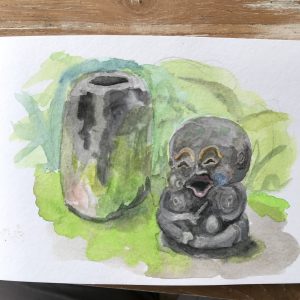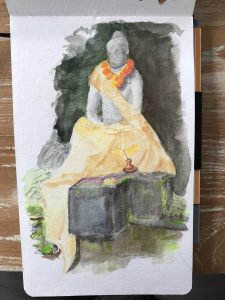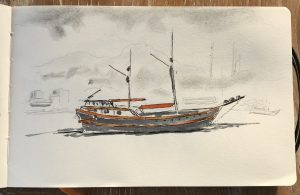Sunday, December 17- Still catching up
Wednesday, December 13
Awoke in the Sorong harbor, had the usual breakfast, then waited for the tenders to take us and our luggage to shore, where we were met by the Sea Trek vans and taken to the airport.
While waiting, I did a pen-and-ink sketch of one of the Bugis-built boats in the harbor. With its black, gray and red paint job, it reminded us of boats in a Turkish harbor. The boat’s lines seem similar:
Srorong has a nice airport, sort of new. It has a cafe where we had lunch with some of our fellow travelers. The Garuda flight to Makassar left exactly on time.
The layover in Makassar was kind of long, but we actually enjoyed it, talking with our new-found friends Angela and Andre. The flight to Denpasar was uneventful, and we were met by a guide and driver, who took us straight to our hotel in Ubud, Wapa Di Ume. It was effectively 11:00 pm when we arrived, so we went straight to bed.
Ubud, Bali
Thursday, December 14
Jet-lagged and lazy, I didn’t do much of anything during the day. Mary took a shuttle into town and did a little shopping, then at 4 pm we were taken to the Paon Bali cooking school for a lesson.
Wapa Di Ume is a luxurious resort. We were upgraded to a villa with its own pool, which I really enjoyed, to my surprise. What a beautiful place! It sits among terraced rice paddies and lush vegetation (the flowers, the flowers!) And like much of Bali, it’s decorated with statues and carved stone.

I had fun while Mary was in town, doing a small watercolor of a Buddha

I asked our guide why, in a Hindu country, they have statues of Buddha. He replied that Bali’s religion is unique. Hinduism traveled a long way, from India to Bali, and on the way, it changed. It became more gentle. Flexibility is one of the prime features of Bali’s religion, and it embraces elements of Buddhism as well as animism. The caste system has been dropped, for example, and people act out of sincerity instead of compulsion. The two of us quite like that.
On the way to the cooking class we saw the volcano in the distance, smoking away, but no drama (thankful for that!) At the cooking school we learned a variety of Balinese dishes: a clear vegetable soup built on a chicken stock; the basic Balinese yellow sauce, a mother sauce which would be used in a variety of dishes, like the chicken curry, minced chicken sate, “urab” salad, and fish steamed in banana leaves; basic peanut sauce, which is used in gado gado; tempe; and a banana dessert flavored with coconut cream and palm sugar.
Friday, December 15
In the morning we traveled to a suburb of Ubud to see a dance performance with gamelan accompaniment. The music is a bit different from the Javanese style. I can’t put my finger on it, but it just seems more upbeat somehow. The story was another Hindu myth, this time about the eternal fight between good (represented by the mythical Barong) and evil (the monster Rangda). The costumes — just the fabrics they were made from — were out of this world. The dancing had all the finesse that I have come to expect.
Normally this kind of performance would have been done only at festival time, but the government’s tourist bureau has encouraged theater companies to put them on all year round.
We then stopped at an art gallery, which I’m afraid I didn’t find impressive. Yes the traditional art was amazingly crafted, but there was a lot of straight commercial stuff that you could find anywhere.
After that, the Monkey Forest, a four-hectare park set aside in the middle of Ubud, with a village temple in a natural setting, populated by Rhesus monkeys. They behaved as you might expect: entertaining, cute, curious, occasionally aggressive.
Once back at the hotel I loaded my collection of drawings, etc., from the cruise and tried to catch up on this blog.
That evening we went to a different resort in the outskirts of Ubud to see the Kecak (pronounced “Ke-chak”) performance. This is performed entirely to vocal music, and the name comes from the sounds the performers make. It’s very rhythmic chanting — think Steve Reich meets Manhattan Transfer — and represents the sounds the mythical army of monkeys makes as they take part in the story of the Ramayana. It was spectacular, as part of the performance depicts the burning down of the villan’s temple. Balls of fire are thrown back and forth across the stage area.
It was amazing to us that this whole performance, done by more than 50 performers, was done for an audience of only four people! In the US they would certainly have called it off. However, I later found out that this is done in villages all over Bali for the performers’ own amusement. The men, in particular, meet once a week to do it. And if you heard it, you would understand: the syncopations and the coordination are quite complex; the performance lasts more than half an hour and is done entirely by rote, passed down entirely through word of mouth. If they didn’t practice this on a regular basis, and frequently, they’d never be able to do it. Again, amazing, and great fun to see and hear. I look forward to the challenge of representing it on canvas when we get home.
Saturday, December 16
In the morning we took the shuttle into the market and did some shopping. In the afternoon we met with our guide, who took us to see some acquaintances of his, who demonstrated how they extract coconut milk, then cook it to extract the oil, and then from the “curds,” soup and a sort of snack or side dish. Of course they had Mary and me grating the coconut, and me squeezing the grated coconut by hand to extract the milk . . . Sorry, I’m not posting those photos!
The soup and the snack/side dish were presented as sort of byproducts. “We have this soup and so on when we make coconut oil, maybe once or twice a week.” But they were delicious, and we thought they were special.
We then went to Ubud’s night market. It reminded us of the night market in Chiang Mai, as it was mostly food carts selling all kinds of local fare. Mary quickly spotted fabric stores across the street, where she found the Balinese men’s headdresses being sold. They’re quite elegant, and she bought three of them to add to our hat collction.
We met up again with these acquaintances, this time in their restaurant, in the outskirts of Ubud. Here we enjoyed a truly delicious dinner, the most authentic one, we feel, that we had during our entire stay in Bali. Fresh, well prepared. Yes, presented with fanfare in a freshly woven basket of palm fronds, but still not “chefy.” We cajoled the owner to write down the recipe for the soup we had at his home — we have an idea of how to make some of the other dishes — and we’re eager to try them at home.

